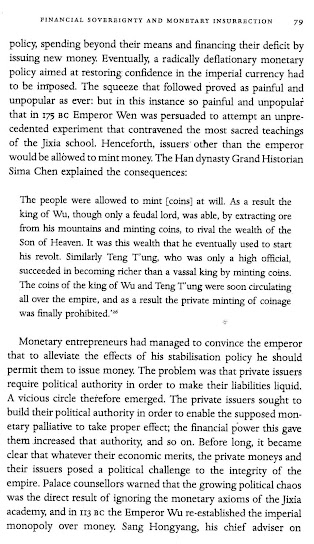That’s in his work entitled “Should we let Banks Create Money?” published by the Independent Review.
The basic reason for claiming the existing bank system (fractional reserve) is fraudulent, as Selgin rightly says, is that where bank depositors are not covered by deposit insurance (DI), any claim by or suggestion made by a bank to the effect that deposits are safe is fraud and for the simple reason that deposits are quite clearly NOT SAFE: witness the hundreds of bank failures thru history. Depositors were not covered by DI prior to the introduction of DI (early 1930s in the US). And today, deposits over some stipulated amount (100k Euros in the EU) are not covered.
In the case of deposits over and above the latter stipulated amount, it is probably fair to say that no fraud is involved because the fact that those excess amounts are not covered by DI is well advertised. But the situation prior to the introduction of DI is another matter.
In the case of the pre 1930s set up, Selgin’s answer to the above fraud charge that is that depositors have always been aware that their money is not entirely safe for the simple reason that depositors normally get interest, at least on term accounts, if not on current accounts (“checking accounts” in US parlance). I.e. how, Selgin asks, do depositors think banks are able to pay interest on deposits if they don’t lend out money at the same time as accepting deposits? And as everyone knows, loaned out money is never entirely safe.
Well the simple answer to that is that a significant proportion of depositors are just not sophisticated enough to ask the latter question. Thus to a significant extent, pre-1930s deposits were a confidence trick aimed at fooling the innocent.
Moreover, if depositors, as Selgin claims, regard their deposits as being much like equity, i.e. you can lose half your money anytime, then why was deposit insurance ever introduced?
The answer is simple: the general view was that a significant proportion of depositors though their deposits were in fact safe and/or that deposits OUGHT TO be safe. By “general view” I mean the view of politicians and millions of depositors.
Incidentally, in addition to the pre 1930s set up, there is always the possibility of that pre 1930s set up being re-introduced (i.e. the possibility of DI being scrapped) since numerous economists are not happy with DI (including, Selgin himself - see here. Thus the discussion here of the fraudulent element in fractional reserve while of obvious relevance to the pre-1930s set up, is also of potential relevance today or in the near future.)
Non-bank lenders.
Another point which supports the claim that a significant degree of deception or fraud is involved in fractional reserve has to do with non-bank lenders like mutual funds, unit trusts and pension funds. The latter three types of organisations (and doubtless some others) are forced by law (at least in the UK) to make it very clear in bold print and those placing money with those organisations can lose as well as make money.
Now if banks are to compete on a level playing field basis with other lending organisations like the above mentioned three, then the wording in the publicity put out by all those organisation should be similar. But any idea that banks prior to the introduction of DI advertised the LACK OF SAFETY of depositors’ money is a joke. No bank would attract deposits if it advertised the lack of safety of its deposits given that other banks kept quiet about the lack of safety of their deposits.
This is clearly a very grey and murky area. It is thus an area where banks will try to get away with any deception that they can. While Selgin is clearly right to say that sophisticated depositors are not defrauded, that is clearly not the case for less sophisticated depositors.
To summarise, fractional reserve banking, prior to the introduction of DI quite clearly involved an element of fraud, though one can argue forever over the exactly extent of the fraud.
And as for the idea that the fraudulent element in fractional reserve is somehow OK once DI is introduced, that is a very questionable argument. If government were to legalise theft while introducing a government run insurance scheme for everyone which compensated them when anything was stolen from them, that would not be a brilliant argument for legalising theft.








